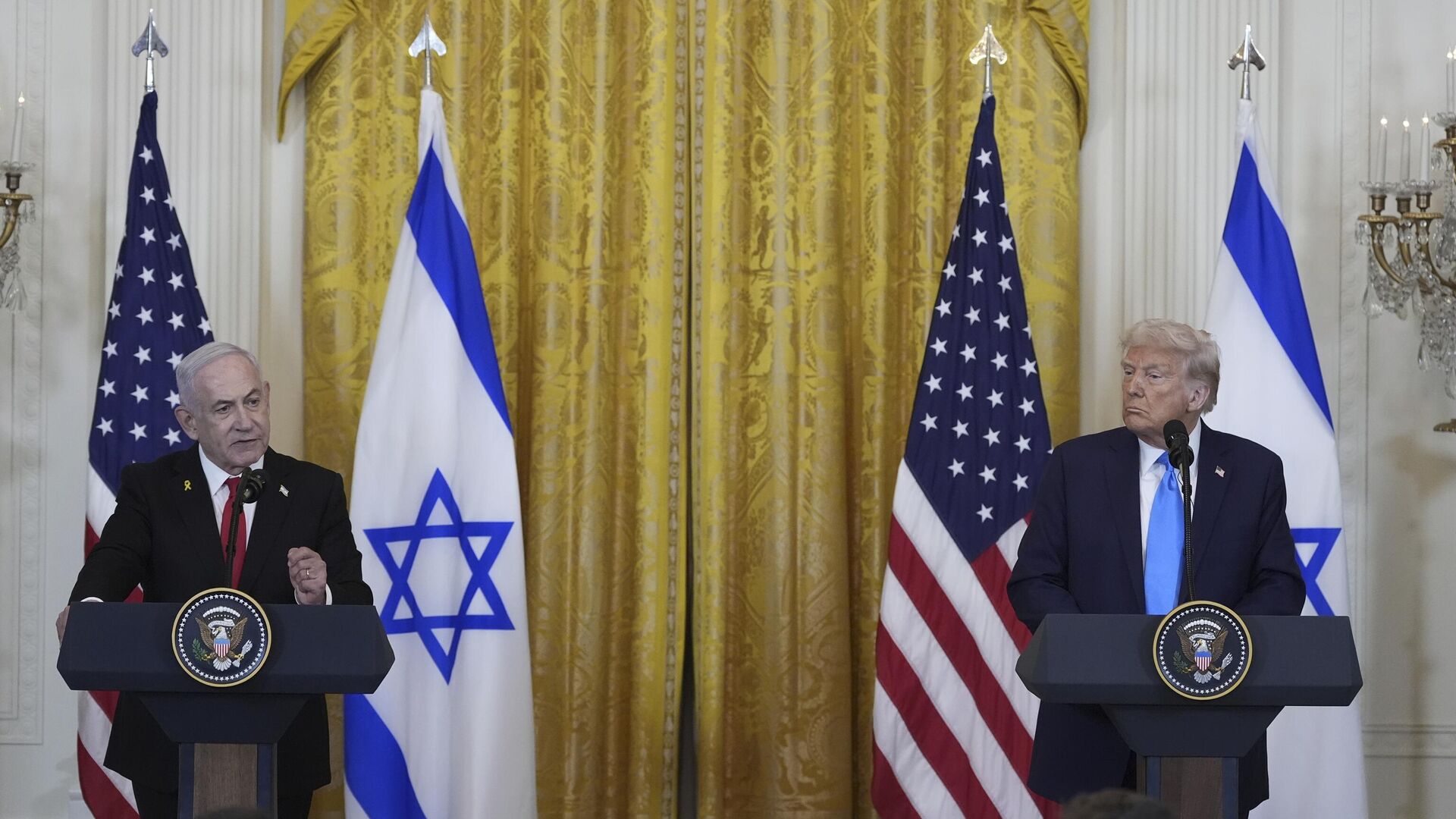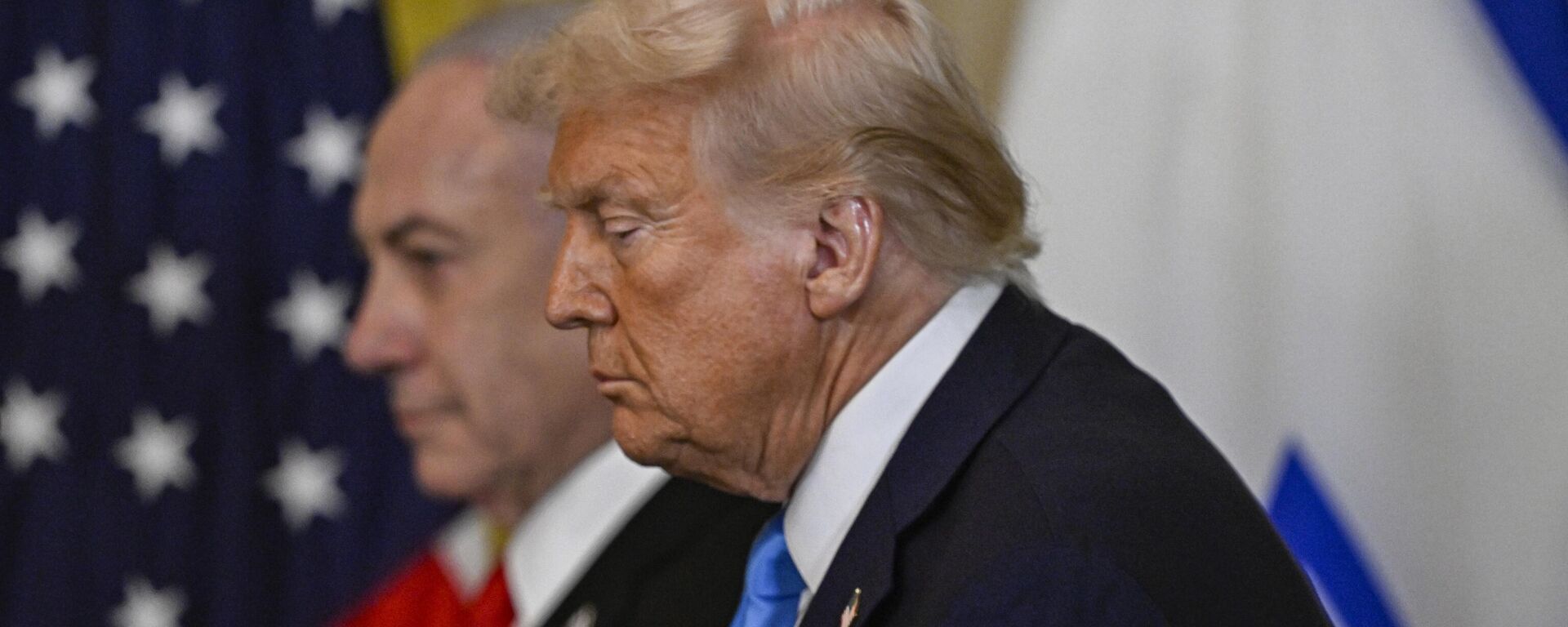https://en.sputniknews.africa/20250206/us-policy-on-palestinian-issue-gaza-strip-a-colonial-approach-1070522729.html
US Policy on Palestinian Issue, Gaza Strip: A Colonial Approach?
US Policy on Palestinian Issue, Gaza Strip: A Colonial Approach?
Sputnik Africa
On Tuesday, US President Donald Trump and Israeli Prime Minister Benjamin Netanyahu held a joint press conference at the White House. During the event, Trump... 06.02.2025, Sputnik Africa
2025-02-06T09:55+0100
2025-02-06T09:55+0100
2025-02-06T09:55+0100
opinion
africa insight
international
donald trump
benjamin netanyahu
gaza
united states (us)
south africa
southern africa
north america
https://cdn1.img.sputniknews.africa/img/07e9/02/06/1070523368_0:160:3072:1888_1920x0_80_0_0_aec7a8f74f27c29d460ad79d19b37fd6.jpg
Egyptian political researcher Farouk Hussein Abu Daif has criticized US policy in Gaza, arguing that it prioritizes American and Israeli interests over Palestinian rights. In an interview with Sputnik Africa, he commented on US President Donald Trump's recent statement about permanently relocating Palestinians from Gaza, describing it as part of a broader strategy that disregards Palestinian sovereignty.He suggested that Trump's approach treats Palestinian land as a commodity rather than a sovereign territory, creating "colonial opportunities for Washington, with the possibility of granting the West Bank to Israel." According to him, this reflects a long-standing Western pattern of destabilizing the Middle East to serve geopolitical interests.Abu Daif also sees the US’s possible intervention in Gaza as an attempt to regain its fading global dominance. He described Washington’s recent actions as "only American efforts to save face and work to achieve an American return after its fading role in the world arena."He further warned that justifying such intervention could set a precedent for similar actions in Africa.Beyond Gaza, Abu Daif believes the US is using similar tactics to pressure nations that oppose its geopolitical agenda, including South Africa. He described Washington’s investigation into land confiscation and alleged mistreatment of citizens as "only a means of American pressure against South Africa, especially in light of its clear position in supporting the Palestinian cause since the beginning of the war."In response, he suggested that South Africa could retaliate economically.The researcher also linked Trump’s rhetoric on Gaza to broader US military strategies. He argued that Trump’s position serves to "provide political cover for Netanyahu to continue the war and avoid international pressure, while weakening any solution based on a two-state solution."According to Abu Daif, an American military presence in Gaza would likely become a new form of colonial occupation rather than a means of stability. With historical examples of US intervention in Iraq, Libya, and Afghanistan, he warned that Washington’s involvement could escalate tensions rather than resolve them.
https://en.sputniknews.africa/20250205/us-president-trump-says-believes-relocation-of-palestinians-out-of-gaza-strip-should-be-permanent-1070506076.html
gaza
united states (us)
south africa
southern africa
north america
middle east
africa
horn of africa
israel
iraq
libya
afghanistan
palestine
Sputnik Africa
feedback@sputniknews.com
+74956456601
MIA „Rossiya Segodnya“
2025
Christina Glazkova
https://cdn1.img.sputniknews.africa/img/07e7/0b/07/1063380906_0:0:673:674_100x100_80_0_0_79628b4d0cd9f29291a57aa13bbf9e7a.jpg
Christina Glazkova
https://cdn1.img.sputniknews.africa/img/07e7/0b/07/1063380906_0:0:673:674_100x100_80_0_0_79628b4d0cd9f29291a57aa13bbf9e7a.jpg
News
en_EN
Sputnik Africa
feedback@sputniknews.com
+74956456601
MIA „Rossiya Segodnya“
Sputnik Africa
feedback@sputniknews.com
+74956456601
MIA „Rossiya Segodnya“
Christina Glazkova
https://cdn1.img.sputniknews.africa/img/07e7/0b/07/1063380906_0:0:673:674_100x100_80_0_0_79628b4d0cd9f29291a57aa13bbf9e7a.jpg
africa insight, international, donald trump, benjamin netanyahu, gaza, united states (us), south africa, southern africa, north america, middle east, africa, horn of africa, israeli-palestinian conflict, israel, iraq, libya, afghanistan, palestine, sovereignty, military
africa insight, international, donald trump, benjamin netanyahu, gaza, united states (us), south africa, southern africa, north america, middle east, africa, horn of africa, israeli-palestinian conflict, israel, iraq, libya, afghanistan, palestine, sovereignty, military
US Policy on Palestinian Issue, Gaza Strip: A Colonial Approach?
Christina Glazkova
Writer / Editor
On Tuesday, US President Donald Trump and Israeli Prime Minister Benjamin Netanyahu held a joint press conference at the White House. During the event, Trump expressed his belief that the relocation of Palestinians from the Gaza Strip should be permanent.
Egyptian political researcher Farouk Hussein Abu Daif has criticized US policy in Gaza, arguing that it prioritizes American and Israeli interests over Palestinian rights. In an interview with Sputnik Africa, he commented on US President Donald Trump's recent statement about permanently relocating Palestinians from Gaza, describing it as part of a broader strategy that disregards Palestinian sovereignty.
"The history of the United States is full of destruction. It seeks to serve American interests only without regard to the rights of other countries. Iraq is the best proof and witness of what is happening," Abu Daif said.
He suggested that
Trump's approach treats Palestinian land as a commodity rather than a sovereign territory, creating "colonial opportunities for Washington, with the possibility of granting the
West Bank to Israel." According to him, this reflects a long-standing Western pattern of destabilizing the Middle East to serve geopolitical interests.
Abu Daif also sees the US’s possible intervention in Gaza as an attempt to regain its fading global
dominance. He described Washington’s recent actions as "only American efforts to save face and work to achieve an American return after its fading role in the world arena."
He further warned that justifying such intervention could set a precedent for similar actions in
Africa."Justifying the existence of its intervention in the occupation of Gaza may open a wide door to major American moves towards the Horn of Africa," he said.
Beyond Gaza, Abu Daif believes the US is using similar tactics to pressure nations that oppose its geopolitical agenda, including South Africa. He described
Washington’s investigation into land confiscation and alleged mistreatment of citizens as "only a means of American pressure against South Africa, especially in light of its clear position in supporting the Palestinian cause since the beginning of the war."
In response, he suggested that South Africa could
retaliate economically."The coming period may witness a move by the South African government to stop exporting minerals to the United States in response to Washington's decision to stop funding the country," Abu Daif reckoned.
The researcher also linked
Trump’s rhetoric on Gaza to broader US military strategies. He argued that Trump’s position serves to "provide political cover for Netanyahu to continue the war and avoid international pressure, while weakening any solution based on a two-state solution."
According to Abu Daif, an American military presence in Gaza would likely become a new form of colonial occupation rather than a means of stability. With historical examples of US intervention in Iraq, Libya, and Afghanistan, he warned that Washington’s involvement could escalate tensions rather than resolve them.



